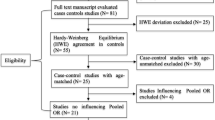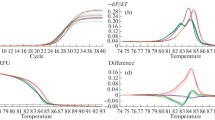Abstract
Candidate gene association studies to detect breast cancer susceptibility loci have yielded few positive associations. Therefore, it is more likely that variants in many genes along related biological pathways combine to influence breast cancer risk. A strong candidate pathway is that of p53-mediated cell-cycle control, DNA repair, and apoptosis. The two major proteins along this pathway are p53 and its negative regulator MDM2. Functional polymorphisms in both genes have been identified. The -309 SNP in MDM2 is associated with increased MDM2 transcription. The Arg72Pro polymorphism of p53 alters the transcription of p53 target genes and modifies the apoptotic potential of cells. Both polymorphisms have been studied with respect to breast cancer risk, with inconclusive results. We have genotyped both polymorphisms in the breast cancer cases and controls nested within the Nurses’ Health Study and Nurses’ Health Study II. Neither SNP is independently associated with overall breast cancer risk. Some indication of gene-by-gene interaction was observed; however, no consistent direction of interaction was apparent.
Similar content being viewed by others
References
Freedman DA, Wu L, Levine AJ (1999) Functions of the MDM2 oncoprotein. Cell Mol Life Sci 55:96–107
Picksley SM, Lane DP (1993) The p53-mdm2 autoregulatory feedback loop: a paradigm for the regulation of growth control by p53? Bioessays 15:689–690
Roth J, Dobbelstein M, Freedman DA, Shenk T, Levine AJ (1998) Nucleo-cytoplasmic shuttling of the hdm2 oncoprotein regulates the levels of the p53 protein via a pathway used by the human immunodeficiency virus rev protein. Embo J 17:554–564
Haupt Y, Maya R, Kazaz A, Oren M (1997) Mdm2 promotes the rapid degradation of p53. Nature 387:296–299
Kubbutat MH, Jones SN, Vousden KH (1997) Regulation of p53 stability by Mdm2. Nature 387:299–303
Dumont P, Leu JI, Della Pietra AC 3rd, George DL, Murphy M (2003) The codon 72 polymorphic variants of p53 have markedly different apoptotic potential. Nat Genet 33:357–365
Pim D, Banks L (2004) p53 polymorphic variants at codon 72 exert different effects on cell cycle progression. Int J Cancer 108:196–199
Thomas M, Kalita A, Labrecque S, Pim D, Banks L, Matlashewski G (1999) Two polymorphic variants of wild-type p53 differ biochemically and biologically. Mol Cell Biol 19:1092–1100
Bond GL, Hirshfield KM, Kirchhoff T, Alexe G, Bond EE, Robins H, Bartel F, Taubert H, Wuerl P, Hait W, Toppmeyer D, Offit K, Levine AJ (2006) MDM2 SNP309 accelerates tumor formation in a gender-specific and hormone-dependent manner. Cancer Res 66:5104–5110
Bond GL, Hu W, Bond EE, Robins H, Lutzker SG, Arva NC, Bargonetti J, Bartel F, Taubert H, Wuerl P, Onel K, Yip L, Hwang SJ, Strong LC, Lozano G, Levine AJ (2004) A single nucleotide polymorphism in the MDM2 promoter attenuates the p53 tumor suppressor pathway and accelerates tumor formation in humans. Cell 119:591–602
Huang XE, Hamajima N, Katsuda N, Matsuo K, Hirose K, Mizutani M, Iwata H, Miura S, Xiang J, Tokudome S, Tajima K (2003) Association of p53 codon Arg72Pro and p73 G4C14-to-A4T14 at exon 2 genetic polymorphisms with the risk of Japanese breast cancer. Breast Cancer 10:307–311
Suspitsin EN, Buslov KG, Grigoriev MY, Ishutkina JG, Ulibina JM, Gorodinskaya VM, Pozharisski KM, Berstein LM, Hanson KP, Togo AV, Imyanitov EN (2003) Evidence against involvement of p53 polymorphism in breast cancer predisposition. Int J Cancer 103:431–433
Weston A, Pan CF, Ksieski HB, Wallenstein S, Berkowitz GS, Tartter PI, Bleiweiss IJ, Brower ST, Senie RT, Wolff MS (1997) p53 haplotype determination in breast cancer. Cancer Epidemiol Biomarkers Prev 6:105–112
Wang-Gohrke S, Rebbeck TR, Besenfelder W, Kreienberg R, Runnebaum IB (1998) p53 germline polymorphisms are associated with an increased risk for breast cancer in German women. Anticancer Res 18:2095–2099
Sjalander A, Birgander R, Hallmans G, Cajander S, Lenner P, Athlin L, Beckman G, Beckman L (1996) p53 polymorphisms and haplotypes in breast cancer. Carcinogenesis 17:1313–1316
Campbell IG, Eccles DM, Choong DY (2005) No association of the MDM2 SNP309 polymorphism with risk of breast or ovarian cancer. Cancer Lett 240(2):195–197
Ma H, Hu Z, Zhai X, Wang S, Wang X, Qin J, Jin G, Liu J, Wei Q, Shen H (2005) Polymorphisms in the MDM2 promoter and risk of breast cancer: a case-control analysis in a Chinese population. Cancer Lett 240(2):261–267
Wilkening S, Bermejo JL, Burwinkel B, Klaes R, Bartram CR, Meindl A, Bugert P, Schmutzler RK, Wappenschmidt B, Untch M, Hemminki K, Forsti A (2006) The single nucleotide polymorphism IVS1 + 309 in mouse double minute 2 does not affect risk of familial breast cancer. Cancer Res 66:646–648
Millikan RC, Heard K, Winkel S, Hill EJ, Massa B, Mayes L, Williams P, Holston R, Conway K, Edmiston S, de Cotret AR (2006) No association between the MDM2 -309 T/G promoter polymorphism and breast cancer in African-Americans or Whites. Cancer Epidemiol Biomarkers Prev 15:175–177
Copson ER, White HE, Blaydes JP, Robinson DO, Johnson PW, Eccles DM (2006) Influence of the MDM2 single nucleotide polymorphism SNP309 on tumour development in BRCA1 mutation carriers. BMC Cancer 6:80
Boersma BJ, Howe TM, Goodman JE, Yfantis HG, Lee DH, Chanock SJ, Ambs S (2006) Association of breast cancer outcome with status of p53 and MDM2 SNP309. J Natl Cancer Inst 98:911–919
Hankinson SE, Willett WC, Manson JE, Colditz GA, Hunter DJ, Spiegelman D, Barbieri RL, Speizer FE (1998) Plasma sex steroid hormone levels and risk of breast cancer in postmenopausal women. J Natl Cancer Inst 90:1292–1299
Baer HJ, Rich-Edwards JW, Colditz GA, Hunter DJ, Willett WC, Michels KB (2006) Adult height, age at attained height, and incidence of breast cancer in premenopausal women. Int J Cancer 119(9):2231–2235
Gauderman WJ (2002) Sample size requirements for matched case-control studies of gene-environment interaction. Stat Med 21:35–50
Jin S, Levine AJ (2001) The p53 functional circuit. J Cell Sci 114:4139–4140
Mayer C, Grummt I (2005) Cellular stress and nucleolar function. Cell Cycle 4:1036–1038
Montes de Oca Luna R, Wagner DS, Lozano G (1995) Rescue of early embryonic lethality in mdm2-deficient mice by deletion of p53. Nature 378:203–206
Jones SN, Roe AE, Donehower LA, Bradley A (1995) Rescue of embryonic lethality in Mdm2-deficient mice by absence of p53. Nature 378:206–208
Acknowledgments
We are indebted to the participants in the Nurses’ Health Study and Nurses’ Health Study II for their continuing dedication and commitment. The authors would like to thank the laboratory of Helena Judge-Ellis for blood sample storage and preparation, Patrice Soule for DNA extraction and plating, and Hardeep Ranu for TaqMan genotyping.
Supported by National Institutes of Health research grants CA87969 and CA65725. D.G.C. is supported by training grant CA09001-27 from the National Institutes of Health. I.D. is supported by research grants CA82838 from the National Institutes of Health and RSG-00-061-04-CCE from the American Cancer Society.
Author information
Authors and Affiliations
Corresponding author
Rights and permissions
About this article
Cite this article
Cox, D.G., Deer, D., Guo, Q. et al. The p53 Arg72Pro and MDM2 -309 polymorphisms and risk of breast cancer in the nurses’ health studies. Cancer Causes Control 18, 621–625 (2007). https://doi.org/10.1007/s10552-007-9004-x
Received:
Accepted:
Published:
Issue Date:
DOI: https://doi.org/10.1007/s10552-007-9004-x




